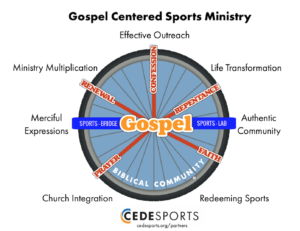Written by Ken Cross, Church Mentor at CEDE Partners – an Initiative of CEDE Sports
Proven Results
Thankfulness and Gratitude has been proven to increase the performance of teams and individuals – Do you believe it?In addition to mentoring Sports Ministers, I am also the team chaplain for two collegiate basketball teams here in Charlotte, NC. As you know 2020 is a crazy year for college teams. Before their season started I sent the following quick note to encourage them. For context, one team cannot go to the college campus yet because the school is all virtual until January and the other team is in a bubble and I cannot visit them. Take the truths below that I wrote for them and let them speak to you too! Here at the beginning of a school year when so many questions are swirling in our heads:
- What will our schedule look like?
- Am I putting myself at risk for potential illnesses?
- Will we fly in a plane this year?
- Are bus rides safe?
- Will there be fans in the stands?
I have some good news for you. Recent studies have proven that if you have gratefulness for what you do have, life all around is better. That catch phrase, “Attitude of Gratitude” now actually means something.In the book, Theoretical Approaches to Multicultural Positive Psychological Interventions*, Dr. Nicole Gabana states the following: “Some of these benefits include increased life satisfaction, social connectedness, positive affect, resilience, altruism, better quality of sleep, and reduced psychological distress. Specifically, in the athletic population, recent research has shown that athletes who have higher levels of gratitude also report greater social support, life and sport satisfaction, team cohesion, and lower levels of burnout.”This got me thinking – which is dangerous, I know – what is the opposite of “thankfulness”. My first thoughts flowed toward “entitlement mentality”.
Entitlement Mentality
Entitlement Mentality (EM) is defined as the state of mind that you are owed something when most people around would beg to differ. The most toxic expression of entitlement mentality is the gap between egotism and reality. Everyone seems to agree that until you get rid of it, you will have difficulties achieving what you want to achieve and it’s unlikely that you will maximize your true potential.Four common characteristics of someone with “EM” are:
- Giving Little Recognition to Others because that is not my job.
- Talking Too Much because they are convinced that what they have to say is much more important … and anyway "ya’ll owe me attention!”
- Ignore Others Opinions
- Interrupt, Deny, Pontificate
Think how our team can be negatively affected by this! Do you feel you are entitled to a certain amount of playing time? Do you thank those that serve you? Do you listen to others or is your music more important than teammates? Have you ever thanked your family for helping you on your path to this school?
Listen To Scripture
As your Chaplain, let me remind you these studies and definitions simply reinforce what the Bible says:"Rejoice always, pray continually, give thanks in all circumstances; for this is God’s will for you in Christ Jesus." 1 Thessalonians 5:16-18 "Through Jesus, therefore, let us continually offer to God a sacrifice of praise — the fruit of lips that openly profess his name. And do not forget to do good and to share with others, for with such sacrifices God is pleased." Hebrews 13:15-16 One of the best things about thankfulness is that the more you choose it, the easier it gets. The more you profess gratitude, the more you notice things to be grateful for. The thankfulness muscles respond to exercise!Let’s flex our “Thankfulness Muscles!” Please be assured I am praying for you! *Gabana, Nicole. (2019). Gratitude in Sport: Positive Psychology for Athletes and Implications for Mental Health, Well-Being, and Performance. 10.1007/978-3-030-20583-6_15. pp.345-370 (Asst. Professor of Sports Psychology at FSU)Clip of this research: https://www.youtube.com/watch?v=sBd2hWae-dE

 The Covid 19 pandemic has certainly been tough on sports ministers. Some that I personally work with, have had to take different roads in the ministry of the church such as: media work, “Cares Act” guru helping the church get two or more months of salaries, or facing the reality of being reduced to only part time. Your situation might be similar to these. There are many unanswered questions ahead as we wonder how school is going to happen, and if we can restart our ministries without compromising safety.
The Covid 19 pandemic has certainly been tough on sports ministers. Some that I personally work with, have had to take different roads in the ministry of the church such as: media work, “Cares Act” guru helping the church get two or more months of salaries, or facing the reality of being reduced to only part time. Your situation might be similar to these. There are many unanswered questions ahead as we wonder how school is going to happen, and if we can restart our ministries without compromising safety.
 Ephesians 2:10 says,
Ephesians 2:10 says, 